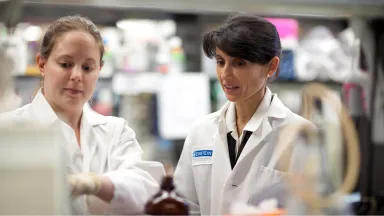
Deyou Zheng, Ph.D.
- Professor, The Saul R. Korey Department of Neurology
- Professor, Department of Genetics
- Professor, Dominick P. Purpura Department of Neuroscience
Area of research
- Bioinformatics and systems genomics; gene regulatory networks; cancer; brain disorders; embryonic heart and neural development.
Phone
Location
- Albert Einstein College of Medicine Michael F. Price Center 1301 Morris Park Avenue 320 Bronx, NY 10461
Research Profiles
Professional Interests
The research areas in our lab are computational genomics and bioinformatics, with a strong focus on mining large-scale high-throughput genomic data. We develop and apply computational techniques for integrating data from comparative genomics, functional genomics and epigenomics to better understand structure, transcription, regulation, and evolution of the human genome, and to investigate how these functions change during developments, diseases and cancers. While we apply similar bioinformatics approaches to the developments of various tissues and organs, we especially focus on genomic functions involved in the development, specification, maturation, and maintenance of human neural system and heart. Our goal is to better understand the genetic base of neuronal and heart development, neuropsychiatric disorders, and other brain diseases. We expect to identify new therapeutic targets such as specific genes whose regulation is disrupted during the early development of patient brains. Applying the same bioinformatics and genomics strategies to mouse models, we also have a strong research program studying the genetic networks and molecular base of cogenital heart diseases and cancer, including single cell analysis.
In collaboration with other experimentalist experts, we grow human neurons in dish by induced pluripotent stem cell (iPSC) technology in order to model human neuronal development and differentiation. We begin by developing iPSC lines from both patients and matching controls, differentiate them to neurons, then use RNA-seq and other deep sequencing technology to identify differentially regulate genes by comparing the transcriptomes between patient-derived neurons and controls. By using advanced experimental technology and computational methods like iPSC technology, deep sequencing (e.g, RNA-seq, scRNA-seq and ChIP-seq), and systems biology approaches for our research, we have identified many novel long non-coding RNA genes that are involved in embryonic neurogenesis and potentially neuropsychiatric disorders. We also find that many genes show allele-biased gene expression in different brain regions, including some that have been implicated in Schizophrenia and Autism Spectrum Disorders, which may help explain some aspects of parent-of-origin effects, twin discordance and reduced penetrance.
Selected Publications
Zheng, D*, Zhao, K and Mehler, M. (2009) Profiling RE1/REST-mediated histone modifications in the human genome. Genome Biol 10:R9. (*corresponding author)
Guo X, Zhang Z, Gerstein MB, Zheng D. (2009). Small RNAs originated from pseudogenes: cis- or trans-acting? PLoS Comput Biol 5(7): e1000449.
Goldberg AD, Banaszynski LA, Noh KM, Lewis PW, Elsaesser SJ, Stadler S, Dewell S, Law M, Guo X, Li X, Wen D, Chapgier A, DeKelver RC, Miller JC, Lee YL, Boydston EA, Holmes MC, Gregory PD, Greally JM, Rafii S, Yang C, Scambler PJ, Garrick D, Gibbons R, Higgs DR, Cristea IM, Urnov FD, Zheng D*, Allis CD* (2010). Distinct factors control histone variant H3.3 localization at specific genomic regions. Cell 140:678-691. (*co-corresponding authors)
Guo X, Freyer L, Morrow B, Zheng D. (2011) Characterization of the past and current duplication activities in the human 22q11.2 region. BMC Genomics 12:71
Lin M, Pedrosa E, Shah A, Hrabovsky A, Maqbool S, Zheng D, Lachman HM. (2011). RNA-Seq of human neurons derived from iPS cells reveals candidate long non-coding RNAs involved in neurogenesis and neuropsychiatric disorders. PLoS ONE 6: e23356.
Guo X, Lin M, Rockowitz S, Lachman HM, Zheng D. (2014) Characterization of Human Pseudogene-derived Non-coding RNAs for Functional Potential. PLoS One 9: e93972
Adam RC, Yang H, Rockowitz S, Larsen SB, Nikolova M, Oristian DS, Polak L, Kadaja M, Asare A, Zheng D, Fuchs E. (2015). Pioneer factors govern super-enhancer dynamics in stem cell plasticity and lineage choice. Nature 521:366-370
Rockowitz S, Zheng D. (2015). Significant expansion of the REST/NRSF cistrome in human versus mouse embryonic stem cells: potential implications for neural development. Nucleic Acids Res. 43:5730-5743.
Wang P, Lin M, Pedrosa E, Hrabovsky A, Zhang Z, Guo W, Lachman HM*, Zheng D*. (2015). CRISPR/Cas9-mediated heterozygous knockout of the autism gene CHD8 and characterization of its transcriptional networks in neurodevelopment. Mol Autism 6:55. (*co-corresponding authors)
Lin M, Lachman HM, Zheng D. (2016). Transcriptomics Analysis of iPSC-derived Neurons and Modeling of Neuropsychiatric Disorders. Mol Cell Neurosci 73:32-42
Zhao D, Lin M, Pedrosa E, Lachman HM, Zheng D. (2017). Characteristics of allelic gene expression in human brain cells from single cell RNA-seq data analysis. BMC Genomics 18:860
Wang P, Zhao D, Lachman HM, Zheng D. (2018). Enriched expression of genes associated with autism spectrum disorders in human inhibitory neurons. Transl Psychiatry 8:13.
Liu Y, Lu P, Wang Y, Morrow BE, Zhou B, Zheng D. (2019) Spatiotemporal Gene Coexpression and Regulation in Mouse Cardiomyocytes of Early Cardiac Morphogenesis. J Am Heart Assoc. 8(15):e012941.
Liu Y, Singh VK, Zheng D. (2020) Stereo3D: using stereo images to enrich 3D visualization. Bioinformatics 36:4189-4190.
Galbo PM, Zang X*, Zheng D*. (2021) Molecular features of cancer-associated fibroblast subtypes and their implication on cancer pathogenesis, prognosis, and immunotherapy resistance. Clin Cancer Res. 27:2636-2647. (*co-corresponding authors)
Liu Y, Wang T, Zhou B, Zheng D. (2021) Robust integration of multiple single-cell RNA sequencing datasets using a single reference space. Nat Biotechnol. 39: 877-884.
Galbo PM, Madsen AT, Liu Y, Peng M, Wei Y, Ciesielski MJ, Fenstermaker RA, Graff S, Montagna C, Segall JE, Sidoli S, Zang X*, Zheng D*. (2024) Functional Contribution and Clinical Implication of Cancer-Associated Fibroblasts in Glioblastoma. Clin Cancer Res. 30:865-876 (*co-corresponding authors)
Ferrena A, Wang J, Zhang R, Karadal-Ferrena B, Al-Hardan W, Singh S, Borjihan H, Schwartz EL, Zhao H, Oktay MH, Yang R, Geller DS, Hoang BH*, Zheng D*. (2024) SKP2 knockout in Rb1/p53 deficient mouse models of osteosarcoma induces immune infiltration and drives a transcriptional program with a favorable prognosis. Mol Cancer Ther 23:223-234. (*co-corresponding authors)
Astorkia M, Liu Y, Pedrosa EM, Lachman HM*, Zheng D*. (2024) Molecular and network disruptions in neurodevelopment uncovered by single cell transcriptomics analysis of CHD8 heterozygous cerebral organoids. Heliyon 10:e34862 (co-corresponding authors)






